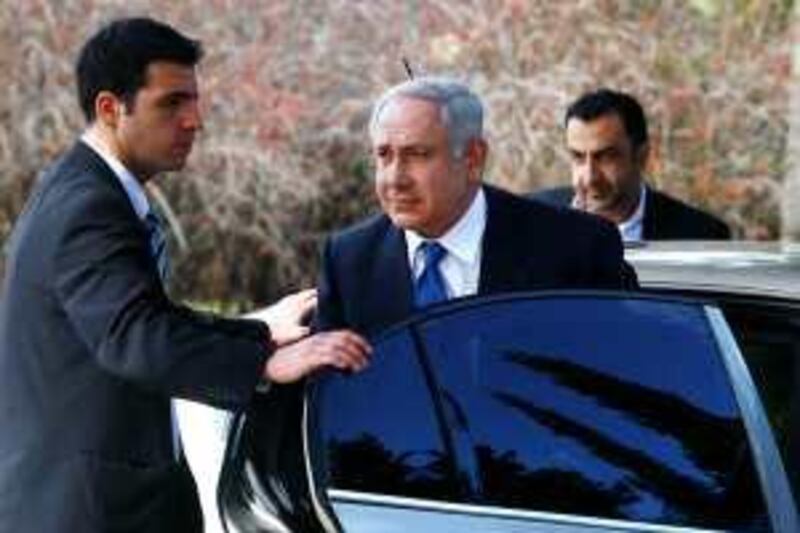Benjamin Netanyahu, the hawkish Likud leader, was tipped yesterday to become Israel's prime minister after Tzipi Livni, his rival, refused to join a right wing coalition, sparking concern about efforts to mediate a long-term truce between Hamas and Israel.
Shimon Peres, the president, asked Mr Netanyahu to form the new government following talks with the two rivals who fought a closely contested general election last month, in which Ms Livni's Kadima party edged out Likud by 28 seats in the Israeli parliament to 27. The choice of Mr Netanyahu, however, had been widely expected after Avigdor Lieberman, who heads the hardline Yisrael Beiteinu party and has suggested revoking the citizenship of Israel's 1.2 million Arabs, on Thursday gave his backing to the Likud leader.
Mr Netanyahu's victory comes amid continuing violence in and around the Gaza Strip, with Palestinian militants and Israeli troops exchanging fire across Gaza's borders. The Likud leader is known for his hardline attitude towards the Palestinian situation. He has called for Hamas to be removed from the coastal strip and said that Israel was too quick to halt its 22-day war in Gaza, in which 1,300 Palestinians were killed. Sporadic violence has continued since Israel ended its military assault on the beleaguered territory on Jan 18.
Egyptian mediators have since come close to arranging an 18-month ceasefire between Hamas and Israel, but their efforts have been blocked by intransigence over the Israeli soldier Gilad Shalit, who has been held in Gaza since June 2006. Israel insists he must be freed before it agrees to lift a two-year blockade on Gaza, while Hamas says it wants to free Sgt Shalit as part of a separate prisoner exchange.
Ms Livni, the outgoing foreign minister, emerged from talks with Mr Peres saying she would have nothing to do with a right wing government. "I will not be a pawn in a government that would be against our ideals," she said. "We need a government based on a two-state solution." Still, some analysts did not expect Mr Netanyahu's appointment to change much on the ground, as because of his hardline politics, he would be scrutinised by the US administration much more than Ms Livni's Kadima party.
"It's not going to change much. Netanyahu is just the other side of the same coin of Kadima," said Jamil Rabah, the director of the Ramallah-based research group Near East Consulting. "It's even possible that there could be change for good. Netanyahu is clear about what he wants, which makes him more susceptible to pressure from the Obama administration, whereas Livni and Kadima are perceived as being peace-lovers and can therefore act without accountability in the US.
"There will be many more watchful eyes on Netanyahu, who will also be forced to show goodwill and willingness to be positive if he is in a coalition with Lieberman, to balance him out. That is the irony of politics." Mr Netanyahu has said that despite Ms Livni's objections, he still hopes to encourage her to join him in a broad coalition. Some observers have dismissed her refusal to join such a coalition as posturing ahead of a period of intense behind-the-scenes bargaining.
Ms Livni has said she will not join a government unless she can be an equal partner, possibly through the sort of "rotation" agreement Israel has tried in the past in which an election's top two winners each get to be prime minister for half of the government's four-year term. Mr Netanyahu, however, has ruled out any such arrangement. With Ms Livni out, Mr Netanyahu may have little choice but to forge a coalition with nationalist and religious parties opposed to peacemaking with the Palestinians and Israel's other Arab neighbours, which could set Israel on a collision course with the US, its top international patron, and its new president, who has vowed to make Middle East peace a top priority.
Such a coalition would include Mr Lieberman, whose Yisrael Beiteinu party finished in third place, effectively making an electoral kingmaker out of the Moldova-born former nightclub bouncer, whose campaign to require Israeli Arabs to swear allegiance to the Jewish state or lose their citizenship exposed him to charges of racism. But while Mr Lieberman announced his support for Mr Netanyahu on Thursday, he also said he preferred a national unity government that included Ms Livni over a narrow hardline right wing coalition. "We need a wide government with the three big parties, Likud, Kadima and Yisrael Beiteinu," Mr Lieberman said. "Netanyahu will lead the government but it will be a government of Netanyahu and Livni together."
tspender@thenational.ae * With additional reporting by agencies





